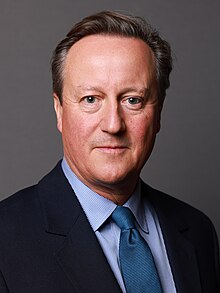
Back David Cameron Afrikaans ዴቪድ ካምረን Amharic David Cameron AN Dauid Cameron ANG ديفيد كاميرون Arabic ديفيد كاميرون ARZ David Cameron AST Devid Kemeron Azerbaijani دیوید کامرون AZB David Cameron BCL
The Lord Cameron of Chipping Norton | |
|---|---|
 Official portrait, 2023 | |
| Prime Minister of the United Kingdom | |
| In office 11 May 2010 – 13 July 2016 | |
| Monarch | Elizabeth II |
| Deputy | Nick Clegg (2010–2015) |
| First Secretary |
|
| Preceded by | Gordon Brown |
| Succeeded by | Theresa May |
| Secretary of State for Foreign, Commonwealth and Development Affairs | |
| In office 13 November 2023 – 5 July 2024 | |
| Prime Minister | Rishi Sunak |
| Deputy | Andrew Mitchell (2024) |
| Preceded by | James Cleverly |
| Succeeded by | David Lammy |
| Leader of the Opposition | |
| In office 6 December 2005 – 11 May 2010 | |
| Monarch | Elizabeth II |
| Prime Minister |
|
| Deputy | William Hague |
| Preceded by | Michael Howard |
| Succeeded by | Harriet Harman |
| Leader of the Conservative Party | |
| In office 6 December 2005 – 11 July 2016 | |
| Preceded by | Michael Howard |
| Succeeded by | Theresa May |
| Assumed office 17 November 2023 | |
| Member of Parliament for Witney | |
| In office 7 June 2001 – 12 September 2016 | |
| Preceded by | Shaun Woodward |
| Succeeded by | Robert Courts |
| Shadow cabinet portfolios | |
| 2003 | Privy Council Office |
| 2004 | Local Government |
| 2004–2005 | Head of Policy Coordination |
| 2005 | Education and Skills |
| Personal details | |
| Born | David William Donald Cameron 9 October 1966 Marylebone, London, England |
| Political party | Conservative |
| Spouse | |
| Children | 4 |
| Relatives | Cameron family |
| Education | |
| Signature | |
| Website | Official website |
David William Donald Cameron, Baron Cameron of Chipping Norton (born 9 October 1966), is a British politician who served as Prime Minister of the United Kingdom from 2010 to 2016. After his premiership, he served as Foreign Secretary in Rishi Sunak’s government from 2023 to 2024. Cameron was Leader of the Conservative Party from 2005 to 2016, and served as Leader of the Opposition from 2005 to 2010. He was Member of Parliament (MP) for Witney from 2001 to 2016, and has been a member of the House of Lords since November 2023. Cameron identifies as a one-nation conservative and has been associated with both economically liberal and socially liberal policies.
Born in London to an upper-middle-class family, Cameron was educated at Eton College and Brasenose College, Oxford. After becoming an MP in 2001, he served in the opposition Shadow Cabinet under Conservative leader Michael Howard, and succeeded Howard in 2005. Following the 2010 general election, negotiations led to Cameron becoming prime minister as the head of a coalition government with the Liberal Democrats. His premiership was marked by the effects of the 2007–2008 financial crisis and the Great Recession, which his government sought to address through austerity measures. His administration passed the Health and Social Care Act and the Welfare Reform Act, which introduced large-scale changes to healthcare and welfare. It also attempted to enforce stricter immigration policies via the Home Office hostile environment policy, introduced reforms to education under Michael Gove as Education Secretary and oversaw the 2012 London Olympics. Cameron's administration privatised Royal Mail and some other state assets, and legalised same-sex marriage in England and Wales. Internationally, Cameron oversaw Operation Ellamy in the First Libyan Civil War and authorised the bombing of the Islamic State in Syria. Domestically, his government oversaw the 2011 United Kingdom Alternative Vote referendum and Scottish independence referendum, both of which confirmed Cameron's favoured outcome. When the Conservatives secured an unexpected majority in the 2015 general election, he remained as prime minister, this time leading a Conservative-only government known as the Second Cameron ministry. Cameron introduced a referendum on the UK's continuing membership of the European Union in 2016. He supported the Britain Stronger in Europe campaign which lost. Following the success of Vote Leave, Cameron resigned as prime minister and was succeeded by Theresa May, his Home Secretary.
Cameron resigned his seat on 12 September 2016, and maintained a low political profile. He served as the president of Alzheimer's Research UK from 2017 to 2023, and was implicated in the Greensill scandal. Cameron released his memoir, For the Record, in 2019. In 2023 he was appointed Foreign Secretary by Rishi Sunak and became a life peer as Baron Cameron of Chipping Norton. His tenure as Foreign Secretary was dominated by the Russian invasion of Ukraine, the Israel–Hamas war, and the Gaza humanitarian crisis. After the Conservatives lost the 2024 general election to the Labour Party, Cameron retired from frontline politics. However, he maintains his House of Lords seat.
As prime minister, Cameron was credited for helping to modernise the Conservative Party and for reducing the UK's national deficit. However, he was subject to criticism for austerity measures. In historical rankings of prime ministers of the United Kingdom, academics and journalists have ranked him in the fourth and third quintiles. Cameron was the first former prime minister to be appointed to a ministerial post since Alec Douglas-Home in 1970, and the first former prime minister to be raised to the peerage since Margaret Thatcher.
